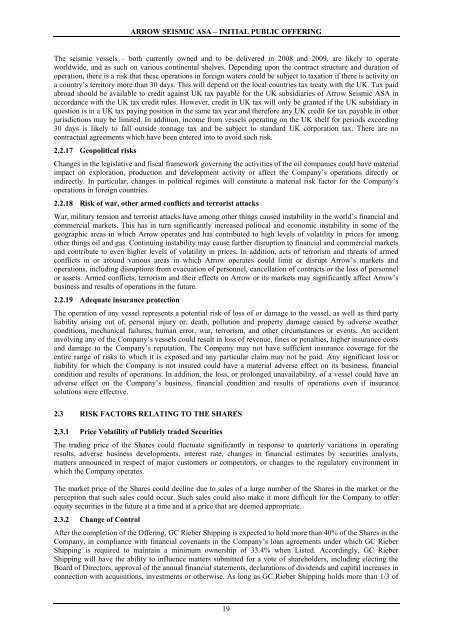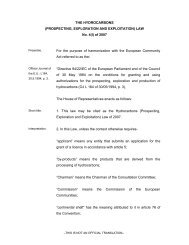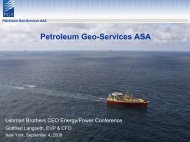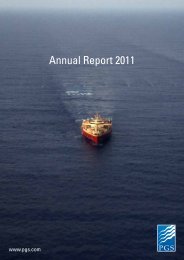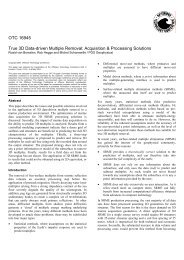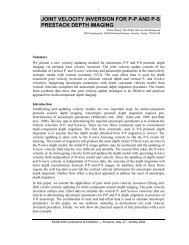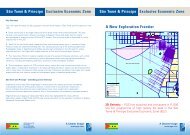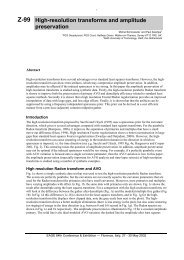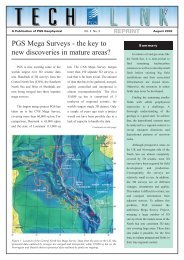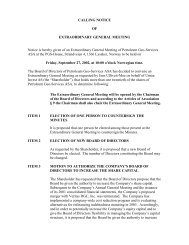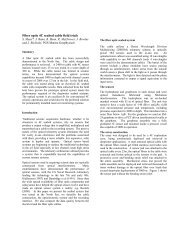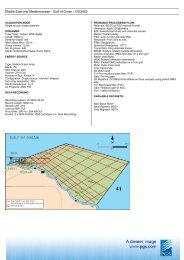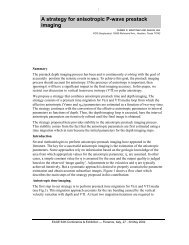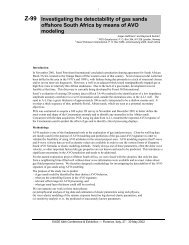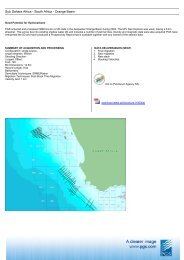Arrow Prospectus - PGS
Arrow Prospectus - PGS
Arrow Prospectus - PGS
You also want an ePaper? Increase the reach of your titles
YUMPU automatically turns print PDFs into web optimized ePapers that Google loves.
ARROW SEISMIC ASA – INITIAL PUBLIC OFFERING<br />
The seismic vessels – both currently owned and to be delivered in 2008 and 2009, are likely to operate<br />
worldwide, and as such on various continental shelves. Depending upon the contract structure and duration of<br />
operation, there is a risk that these operations in foreign waters could be subject to taxation if there is activity on<br />
a country’s territory more than 30 days. This will depend on the local countries tax treaty with the UK. Tax paid<br />
abroad should be available to credit against UK tax payable for the UK subsidiaries of <strong>Arrow</strong> Seismic ASA in<br />
accordance with the UK tax credit rules. However, credit in UK tax will only be granted if the UK subsidiary in<br />
question is in a UK tax paying position in the same tax year and therefore any UK credit for tax payable in other<br />
jurisdictions may be limited. In addition, income from vessels operating on the UK shelf for periods exceeding<br />
30 days is likely to fall outside tonnage tax and be subject to standard UK corporation tax. There are no<br />
contractual agreements which have been entered into to avoid such risk.<br />
2.2.17 Geopolitical risks<br />
Changes in the legislative and fiscal framework governing the activities of the oil companies could have material<br />
impact on exploration, production and development activity or affect the Company’s operations directly or<br />
indirectly. In particular, changes in political regimes will constitute a material risk factor for the Company’s<br />
operations in foreign countries.<br />
2.2.18 Risk of war, other armed conflicts and terrorist attacks<br />
War, military tension and terrorist attacks have among other things caused instability in the world’s financial and<br />
commercial markets. This has in turn significantly increased political and economic instability in some of the<br />
geographic areas in which <strong>Arrow</strong> operates and has contributed to high levels of volatility in prices for among<br />
other things oil and gas. Continuing instability may cause further disruption to financial and commercial markets<br />
and contribute to even higher levels of volatility in prices. In addition, acts of terrorism and threats of armed<br />
conflicts in or around various areas in which <strong>Arrow</strong> operates could limit or disrupt <strong>Arrow</strong>’s markets and<br />
operations, including disruptions from evacuation of personnel, cancellation of contracts or the loss of personnel<br />
or assets. Armed conflicts, terrorism and their effects on <strong>Arrow</strong> or its markets may significantly affect <strong>Arrow</strong>’s<br />
business and results of operations in the future.<br />
2.2.19 Adequate insurance protection<br />
The operation of any vessel represents a potential risk of loss of or damage to the vessel, as well as third party<br />
liability arising out of, personal injury or, death, pollution and property damage caused by adverse weather<br />
conditions, mechanical failures, human error, war, terrorism, and other circumstances or events. An accident<br />
involving any of the Company’s vessels could result in loss of revenue, fines or penalties, higher insurance costs<br />
and damage to the Company’s reputation. The Company may not have sufficient insurance coverage for the<br />
entire range of risks to which it is exposed and any particular claim may not be paid. Any significant loss or<br />
liability for which the Company is not insured could have a material adverse effect on its business, financial<br />
condition and results of operations. In addition, the loss, or prolonged unavailability, of a vessel could have an<br />
adverse effect on the Company’s business, financial condition and results of operations even if insurance<br />
solutions were effective.<br />
2.3 RISK FACTORS RELATING TO THE SHARES<br />
2.3.1 Price Volatility of Publicly traded Securities<br />
The trading price of the Shares could fluctuate significantly in response to quarterly variations in operating<br />
results, adverse business developments, interest rate, changes in financial estimates by securities analysts,<br />
matters announced in respect of major customers or competitors, or changes to the regulatory environment in<br />
which the Company operates.<br />
The market price of the Shares could decline due to sales of a large number of the Shares in the market or the<br />
perception that such sales could occur. Such sales could also make it more difficult for the Company to offer<br />
equity securities in the future at a time and at a price that are deemed appropriate.<br />
2.3.2 Change of Control<br />
After the completion of the Offering, GC Rieber Shipping is expected to hold more than 40% of the Shares in the<br />
Company, in compliance with financial covenants in the Company’s loan agreements under which GC Rieber<br />
Shipping is required to maintain a minimum ownership of 33.4% when Listed. Accordingly, GC Rieber<br />
Shipping will have the ability to influence matters submitted for a vote of shareholders, including electing the<br />
Board of Directors, approval of the annual financial statements, declarations of dividends and capital increases in<br />
connection with acquisitions, investments or otherwise. As long as GC Rieber Shipping holds more than 1/3 of<br />
19


